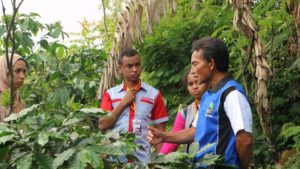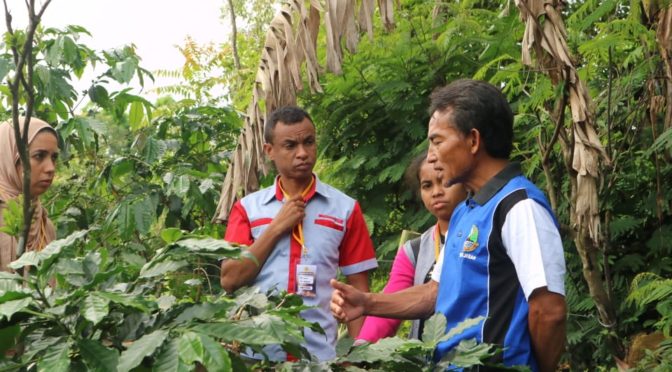In our coffee project, we have just recently celebrated the hunting and littering ban and we are now approaching a new exciting step: a Javan workshop on wildlife-friendly coffee! What an exciting way to share our progress with other farmers, students, stakeholders, and coffee experts. And there will be time to discuss about several topics that are in the programme.

- Agroforestry – Dr Budiadi, our research counterpart for the coffee project and dean of the Faculty of Forestry at UGM, is going to talk about the importance of agroforestry for biodiversity and its value for conservation. With high percentages of shifting forested areas to agriculture area, the value of agroforestry for conservation is now key.
- Importance of biodiversity for coffee plantations – Dr Imron, our research counterpart and lecturer at UGM, is going to talk about the importance of wildlife and plants in coffee plantations. Many animals have roles as pollinators, seed dispersers, and pest control, while plants are important as shade trees or understorey plants to improve soil quality, protect from direct sun, fixate nitrogen, stabilise the Ph, attract pollinators, and provide resources for humans. These concepts are key to share with farmers approaching organic and wildlife-friendly practices.
- Governmental help for organic farming – Mr Gunasantika from the Department of Agriculture is going to introduce a topic that is pivotal for farmers who want to first approach organic farming and to farmers who want to continue being organic and find solutions to improve their yields. What are the benefits of turning to organic? What is the help from the Government? I am sure farmers will be interested in these topics.
- Organic certification standards – Mr Firdian from the Department of Agriculture is going to talk about a topic that is very technical but again very important. Farmers need to know what are the standards to obtain organic certification, and plan in advance what they need to do with their crops.
- Waste management – After the lunch break, Miss Purwadini is going to introduce us to her project involving waste management in the Garut regency. Her company specialises in recycling systems and she is helping the communities of Cipaganti and Pangauban to create an efficient waste management plan. This topic is very important since efficient waste management infrastructure prevents pollution and water/soil contamination.
- Coffee and conservation success story – Mr Mujianto from Swara Owa, an Indonesian NGO working mainly with gibbons, is presenting their successful work using coffee to promote the conservation of gibbons. They started their work in 2005 but their Coffee and Primate Conservation Project was initiated in 2008. They have their brand Kopi owa or Owa coffee, established in 2012, to promote shade grown coffee as one of the forest products from the habitat of Javan gibbons.
- Improvement of coffee robusta production in Kemuning – Mr Prayoga from UGM is working closely with the farmer group Tani Pertani Maju in Kemuning forest and he is promoting conservation measures to reduce their impact on biodiversity, including a hunting ban. His talk would be inspiring for coffee farmers all around Java who want to put in measures to protect biodiversity, whilst obtaining certification for their coffee.
- Wildlife-friendly coffee in Cipaganti and Pangauban – Last but not least, our farmers Pak Ajum and Pak Janjan, leaders of the communities in Pangauban and Cipaganti respectively, are going to promote our coffee project in the workshop. They are going to talk about all the actions we took and all the advances of the coffee project.
It is my pleasure to introduce to everybody this amazing workshop that is making all the LFP team members very busy but also excited! I need to thank the team for all the amazing work done in preparing the workshop. Now need to finish the last bit and I hope that we will all have a great cultural exchange in a green environment!
MARCO CAMPERA
P.S. We chose the Green Hotel Kamojang as the location for our workshop since this hotel is immersed in green and it is part of a chain of green hotels. Their policy is no plastic, green energy (they obtain 70% of the energy for the hotel from solar panels), and they provide amazing activities in contact with nature for their customers. Even if we cannot experience all of the luxuries the hotel has to offer since we will have a limited stay, we believe this is a perfect choice for our workshop.

